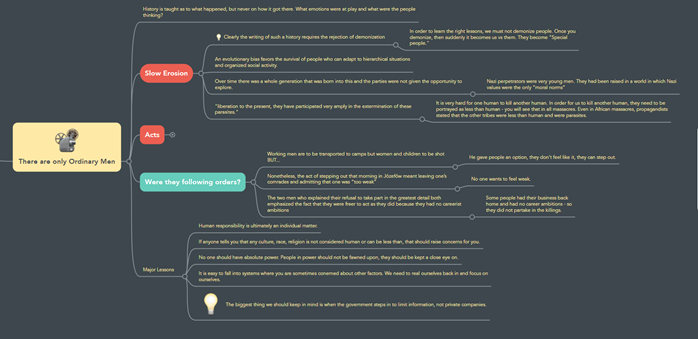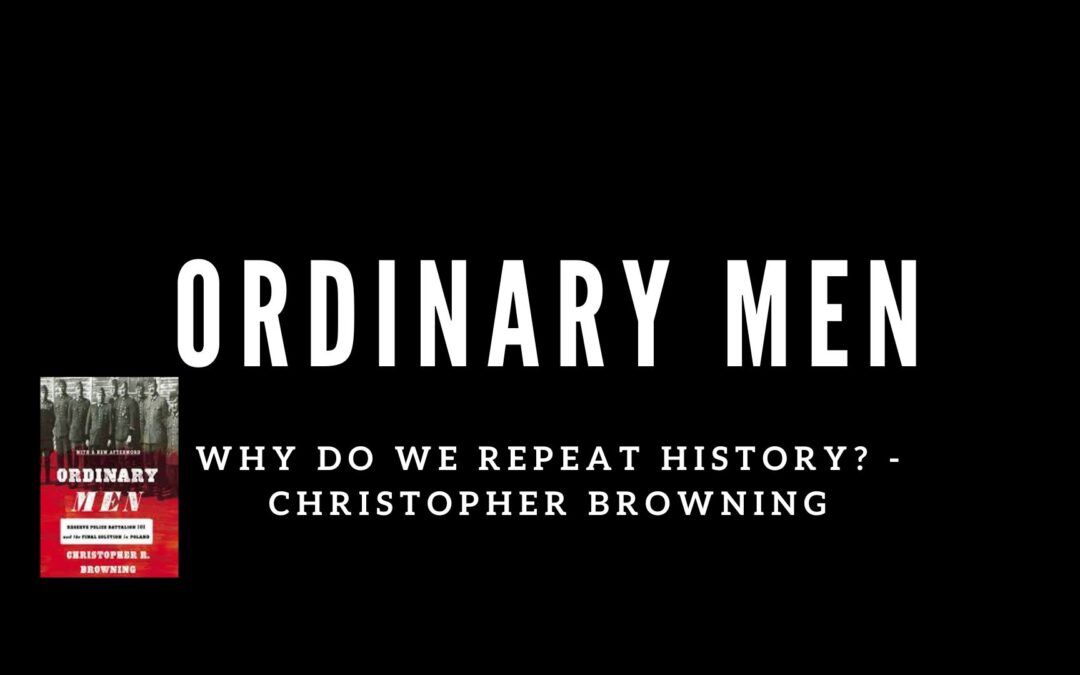Synopsis
Ordinary Men by Christopher Browning is an excellent book because it highlights human flaws. It shows that “Ordinary Men” can commit atrocities. We think that “special people” committed the holocaust and it can never happen again, but, in reality, we humans are governed by certain psychological principles that can make us do unimaginable things. Think of Ordinary Men as an extension of experiments such as the Prison Experiment, where everyday men became sadistic towards the prisoners.
Why do we humans not learn from History? Why do we keep on repeating the same mistakes? Is there a reason we keep on making the same mistake?
Christopher explains how ordinary people such as businessmen and teachers can commit mass murders. Then, he takes us on what happened during World War II and how we should not fall into the same trap.
Why do we repeat history?
Ordinary Men by Christopher Browning is a fantastic book highlighting our psychological pitfalls. Christopher is a tremendous author; after all, he’s written many books about Nazi Germany and how bad things happened because ordinary people were turned into mass murderers.
When we read about History, we only talk about what happened. We never talk about how we got there. That is why reading books such as Ordinary Men is so important because it talks about how we got there. When we read about Nazi Germany, we think that Nazis were special people and those kinds of people would never be born again. But that is definitely not the case.
Nazis were not special people. They were people just like you and me who, over time, due to our basic human instinct, were turned into monsters. This is why it’s important not to demonize people because once we demonize people, we put them in a particular category, and it makes it hard to learn from History.
We, humans, have a fallacy that when bad things will happen, they will happen overnight, but things in Germany didn’t happen overnight. It took a long time. The Jews were put in a special category. For example, Germans started to refer to Jews as “rodent infestations.” Once those words were used, it made them easy to “eradicate.”
As the German army would conquer lands, the reserve police battalions would come behind them and do the “dirty” work. People who were not fit for the military were drafted into the reserve police force.
We think that in World War II majority of the atrocities were done by the SS or the Nazis. But the majority of that bidding was done by the reserve police battalion that contained people such as farmers and businessmen. These people were converted into killing machines. The question comes to mind of how it happened.

Well, let’s talk about certain factors that led to regular people turning into monsters:
Slow Erosion
“This will never happen here.” This is what people often say. As we discussed earlier, we repeat/rhyme history. We often think that bad things will never happen in our country, but Germans thought the same thing during that period.
But how can we not repeat history? The first step is the rejection of demonization. When we demonize people, we put them in a category, and once we put them in a category, it is hard for us to “put ourselves” in their shoes. If crazy people are put into a crazy category, it is hard to have empathy and understand the emotions that lead to hideous acts.
In general, it is hard for one person to hurt another person. A rational mind cannot justify killing another human being. This is something built into our psychology. But, people who understand power also understand the emotions that are required to override the rational mind. The thing is that the rational mind does not get overridden immediately. It takes time. People who want absolute power understand that most people will read History but will never question how a country got there.
Nazis understood propaganda as a science. At first, it was simply about Germans getting their business back then it turned to “Jews” being rodents and pests that are messing up Germany. The propaganda arm of Nazis dominated the newsprint and audio. People in Germany had no access to any other information. Remember, they did not have internet. Think about it, when was the last time you thought twice about killing a rodent that was invading your house?
“Liberation to the present, they have participated very amply in the extermination of these parasites.” – Quote from Ordinary Men
The same analogy was used in several African massacres.
Acts Done By “these” Men
So what made the most impact on me in this book? It was the acts that were done by regular people.
The Prison Experiment
“What else concerns this action, I must to my greatest regret emphasize, is last of all that it bordered on sadism.” – Quote from Ordinary Men
In 1973, Zimbardo conducted what is now a famous experiment called, The prison experiment. He wanted to find out the root cause of the behavior conducted by guards in American Prisons. This is one of those experiments that due to today’s ethical standards, cannot be repeated. But there were some interesting things we learned from that experiment.
Prisons are an interesting place. The reason is that in prison, there are certain controls that help to create an isolated environment. The isolated environment helps us create a control group where we often can see how the basics of human instincts perform in a “controlled” environment. For example, often in prison, there are rigid power structures, an internal economy that often works with trade, and certain unspoken rules.
In the prison experiment, as the guard and prisoners struggled for power, it was seen that the guard became abusive and sadistic. They used more cruel methods to control the prisoners. It got so bad that after a while, they had to stop the experiment.
This happened in America. This shows that there are certain underlining psychological principles that we humans are not often aware of and those underlining psychological principles come out if certain factors are present. That is why it is important to understand basic human instincts.
Below are a few examples from the book that I think stood out:
“Yet another policeman remembered that the first Jew he shot was a decorated World War I veteran from Bremen who begged in vain for mercy.” – Even the people who fought for Germany were executed.
‘Ever anxious to get credit for his company’s body count, Riebel dutifully reported, “In the Jewish action of September 1, the Jews seized on August 31 were shot. Shot by 9th Company were 290 men and 40 women”
Think about an environment you are in where you are raised with seeing this behavior around you being normal. Then, you still have basic instincts such as having other people feel proud of you. So, the more you kill, the more your upper brass is proud of you, and the more you move up the ladder. It might sound sadistic, but that was the truth around that timeframe.
There are so many instances where most people did bad things for self-gratification and to have “someone” proud of them. When the “resettlement” began, they had to “round” up people. But, it was a logistical nightmare to take the old, women, and children and transport them. So, over time, they decided it was more efficient to simply execute them.
“My neighbor then shot the mother, and I shot the child that belonged to her because I reasoned with myself that after all without its mother the child could not live any longer” – Think about it. We, humans, are capable of justifying numerous things. Even bad things, we can justify.
“When the men arrived at the barracks in Biłgoraj, they were depressed, angered, embittered, and shaken.78 They ate little but drank heavily. Generous quantities of alcohol were provided, and many of the policemen got quite drunk”
“Concern over the psychological demoralization resulting from Józefów is indeed the most likely explanation of that mysterious incident in Alekzandrów several days later”
When men go to war, they have memories and PTSD (Post-traumatic stress disorder). Higher-ups knew that alcohol can serve as an incentive to forget things and numb the pain. But after a while, the mind created phycological barriers that made soldiers less emotional and work like machines. This is why extermination camps were created. The people didn’t have to kill on the spot, and the killing was distant as they were simply putting people on the train.
“Whenever the Jewish worker population swelled noticeably, the estate administration phoned Captain Hoffmann, and a German police commando was sent to shoot the surplus Jews” – Can you imagine overtime just treating people like they’re not “Human?”
Were people just following orders
“Working men are to be transported to camps but women and children to be shot” – Major Trapp
Trapp gave people an option, if they don’t feel like it, they can step out and not do any of the killings. Some people had their businesses back home and had no career ambitions – so they did not partake in the killings. The two men who explained their refusal to take part in the greatest detail both emphasized the fact that they were freer to act as they did because they had no careerist ambitions
“Nonetheless, the act of stepping out that morning in Józefów meant leaving one’s comrades and admitting that one was “too weak.”
No one wants to feel weak. This is a basic human instinct. It is amazing what people will do in order not to be perceived as weak.
Major Lessons Learned
- Human responsibility is ultimately an individual matter.
- If anyone tells you that any culture, race, or religion is not considered human or can be less than, that should raise concerns for you.
- No one should have absolute power. People in power should not be fawned upon, they should be kept a close eye on.
- It is easy to fall into systems where you are sometimes concerned about other factors. We need to real ourselves back in and focus on ourselves.
- The biggest thing we should keep in mind is when the government steps in to limit information, not private companies.
- We keep repeating mistakes because we think we are special – our culture, religion, race, etc are all special. Travel and meet people. It is our experiences that define us.
“It’s easier to fool people than to convince them that they’ve been fooled” – Mark Twain

